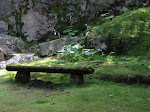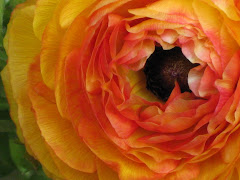| Nicely landscaped garden bed with awful dyed mulch - perhaps to match the bricks? |
Have you seen the commercial with the Irish
man who has more time to spend with his wife because he uses dyed mulch? I have never been so disgusted by a
commercial, ever.
Here is why.
Mulch
is not a ground cover!
Here is another reason why.
Mulch should absolutely break down over the year in order to add organic material back
into the soil!
Garden beds are mulched for several important
reasons:
- To suppress weeds that might grow between plants. A light mulching (1-2” deep) creates a nice barrier to help prevent weed seeds from germinating.
- To help the soil retain moisture. A light mulching allows rainwater to seep through and helps keep the soil from drying out too fast.
- To help the soil stay cool during the heat of summer. Again, a light mulching helps keep the sun’s direct rays from penetrating and heating the soil and plants’ roots.
- To add organic matter back into the soil. As the mulch is broken down, important microscopic organisms are working to do their jobs and enrich the soil.
Today’s residential and commercial landscapes
are over-mulched. Rather than planting,
weeding, and maintaining a garden or landscape, garden beds are spread
thickly with mulch, giving “green space” a nice brown coating, or in some cases, a wash of blood red wood shreds. Where in nature would one find a blanket of red except on a field after a bloody battle?
Dyed mulches (black, red, dark brown (the
actual color of shredded wood)) are often composed of recycled wood waste such
as old hardwood pallets, decking, or worst of all, old pressure treated CCA
lumber. Ground up trash wood is treated
with chemicals (for bonding) and dyes to give it a uniform color.
The biggest reason why I abhor dyed mulch is
that it does not break down to enrich the soil as natural and organic soil does. The possibilities of chemicals in the
recycled wood trash that leach into the soil could harm, or even kill,
beneficial soil bacteria, insects, earthworms, or even the plants the mulch is supposed
to protect.
When you mulch, you should use 100% and
organic shredded hardwood, pine, pine straw or fines, or composted leaf mulch
to do the jobs that mulch is supposed to do, and to make your garden full of
beautiful plants (and not painted wood trash)!


